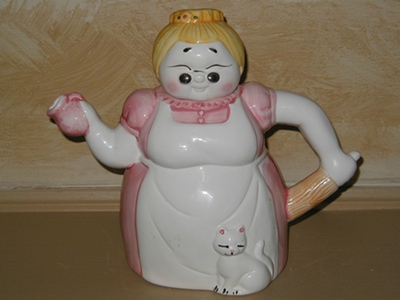I have an antique teapot in the shape of an obese woman in a pink house dress and a white apron. She is holding a cup in her spout hand, and a rolling pin in the handle hand. Also, there is a cat at her feet. Her head is the cap. There are no markings anywhere on it that I can see. This teapot has been in the family for a very long time, and handed down from my grandmother. I have not been able to find anything like it, and am very interested to know what we have here. [img size=400]https://kovels.com/media/kunena/attachments/legacy/images/Lady_Teapot_1.JPG[/img]
I didn’t say you were dissing, nor did I imply that I didn’t like your answer. So I’m not sure why you’re getting so defensive. I was merely responding to your comments, so that you had a better idea of how we got it. Your original comments were quick, and did not have as much info as your last one. Therefore, I was just going by what was there.
I’ts true, I have no idea how long she had it. All we know for certain is that it was a gift to her, when we don’t know, but we do know that she said she had it for a long time. I have done a lot of searching for it, and have only found one other example in a different color dress that someone sold on Ebay. But they didn’t have any info on it. Also, during my research I’ve found that pottery can pre-date markings. And I’ve heard from numerous sources over the years that the 100 year rule has leeway depending on the object in question and it’s rarity/collectibility. Admittingly, I’m still learning about this, hence this topic.
I am not out to diss you or your family, but this would be not the first time that family lore goes up against common sense and facts. Remember, even a hundred-year-old person can buy a new item a day before he dies – it does NOT make the item 100 years old! So the year your grandmother was actually *born* is totally irrelevant in this context.
Fact is that all internationally traded items from the time period in question would be (normally) permanently marked with country of origin. Except japanese imports, which carried an -often lost- sticker. Then there is the obviously Asian facial expression, typical for post-1952 imports from Japan. And finally, you can see for yourself that the style is not what one would see when checking out history books depicting turn-of-the-century wares.
Your heirloom is a typical post-war genre item and it is not my fault if you do not like that answer.

